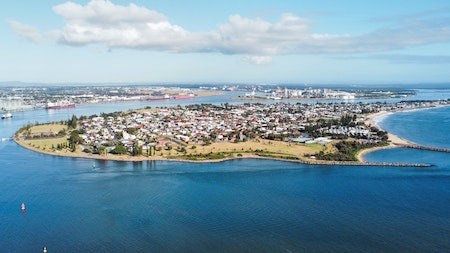Russia launched its invasion of Ukraine on 24 February 2022. One motive suggested for the conflict is Russia’s fear that Ukraine could join the North Atlantic Treaty Organisation (NATO). Since then, the conflict has escalated, with millions of Ukrainian citizens fleeing to neighbouring countries.
Different countries have responded in various ways to the conflict. However, the effects have already been felt throughout the world.
FNB Commercial Property Finance Property Strategist, John Loos, believes the path of the conflict is too uncertain to pinpoint what the impact on the economy and property market in South Africa might be. However, he says there are some obvious potential impact points on the domestic property market due to the economic impacts.
What are the obvious potential impact points?
Inflation
Loos says it is likely that the conflict will add to already worrying global inflationary pressures, particularly energy prices, as Russia is a key oil and gas producer.
“Potential energy supply disruptions in the region have sent energy prices rising significantly. This is in part a result of the conflict but also because of potential sanctions and boycotts against Russia,” says Loos.
“On March 4, the Brent crude spot price was near $115 a barrel, which was already 17% higher than on 23 February - the day before the invasion. This has added to already increasing energy price inflation pressures. The recent Brent crude price levels were about 124% above the levels experienced at the end of 2020, and fuel prices in SA were already increasing dramatically.
“It seems likely that the Ukraine invasion will add to this fuel price inflation. In addition, the escalation of boycotts and sanctions against Russia and its allies – with the potential for retaliation - could further aggravate broader supply chain disruptions globally. This could be inflationary.”
Domestic agricultural economist, Wandile Sihlobo, also foresees potential food price inflation.
“Ukraine is a key agriculture producer, and maize, wheat, soybean, and sunflower oil prices have significantly increased in the past year.”
Loos says that inflation in certain commodity prices in agriculture and mining - particularly gold as a safe haven investment – could be advantageous for certain local agriculture and mining companies. However, a Ukraine-driven inflation of local food and fuel prices and more overall inflation impact from general global inflationary pressures are likely to be negative. It will have the effect of eroding consumer incomes and create a risk of increased interest rates if the SARB’s inflation targets are exceeded.
“Apart from higher inflation eating into consumer incomes that are already under pressure from a weak economy, rising interest rates lift the cost of servicing debt, further eating into incomes. The war could potentially add to these pressures that have already been mounting.
“The impact of the war, especially as a result of pressure on global energy prices, can also be a global economy negative - and so a domestic economy downside risk - and this has been raised by FNB’s economics team,” says Loos.
“The potential downside risk will be through SA’s trade, and the mining and manufacturing sectors are key in this regard.”
Impact
Loos says that higher inflation – with the risk of higher interest rates - and slower economic growth are the basic macroeconomic risks that appear to result from the war in Ukraine.
“At this stage, it is difficult to predict the effects of these risks. However, there are some potential impact points for the domestic commercial property sector if such an economic impact plays out,” says Loos.
“Given the partial link between short term interest rate and long bond yields on the one hand and property capitalisation (cap) rates on the other, some negativity around inflation prospects as a result of the Ukraine conflict led to some sell-off of South African Government bonds. The average yield for 10-year bonds rose from 9.26% on 25 February to 9.665% on 4 March.
“Although this is not a major sell-off in bonds, it does suggest that the fuelling of heightened inflation and interest rate fears would likely exert upward pressure on local property capitalisation rates. This would be a negative for property valuations,” says Loos.
Commercial vacancies
Because SA’s economic situation is fragile at best, any major global recessionary impact on the domestic economy could increase commercial property vacancy rates again.
“After several years of rising average vacancy rates in all three major commercial property markets - industrial, retail and office - our recent FNB Property Broker Surveys late in 2021 were pointing towards a possible stabilisation in retail and office vacancy rates and a drop in industrial property vacancy rates. This was supported by some recovery in the economy following the sharp 2020 GDP contraction,” says Loos.
“Although industrial property may weather a moderate economic storm, the fragile retail and office sectors - challenged by increasing online retail and remote working - could experience renewed weakness. This could result in rising vacancy rates and further downward pressure on rentals.”
He says that all three sectors could experience more significant economic pressures than usual due to the potential global economic impact of the Ukraine crisis.
“Industrial property’s link to the global economy is quite strong as warehousing and logistics space is used for imports and exports. And The local manufacturing sector also has strong trade links to the rest of the world,” says Loos.
“The retail sector’s links to the global economy are less direct, with rand weakness and higher global inflation partially bringing imported inflation into consumer goods prices. This is particularly the case for food and fuel prices with their links to global pricing.”
Loos says the office market is possibly the least directly exposed to the potential global economic impact of the Ukraine conflict. Although, it does house certain tenants who trade with the world. However, the potential impact is more indirect, through the slowing economy influencing the number of office worker jobs. This, in turn, exerts pressure on demand for office space. In addition, higher interest rates would also exert pressure on landlords and tenants.
Property Valuation
With the risk of additional upward pressure on capitalisation rates as a result of long and short interest rates, and the economic impact on vacancy rates translating into downward pressure on rentals, Loos says the Ukraine conflict would appear to be a source of negative pressure on property valuations.
He does say, however, that it is too early and the situation is too uncertain to tell if the potential economic and interest rate impact will be enough to delay the expected return in the All Property Average Capital Value (MSCI data) to positive nominal growth in 2022.
“The negative impact of the war in Ukraine will be pushing against the lagged positive impact of a normalisation in economic activity - and some economic recovery - following the deep 2020 lockdown recession,” says Loos.
“The indirect impact of the war, through the economic impact on SA, could possibly indirectly affect operating costs, with the inflationary impact feeding through to service provider costs. Also, if electricity sales revenues are dampened by economic weakness, Eskom could attempt to claw it back through tariff increases. In addition, councils could do the same with rates and other tariff increases if economic pressures cause ratepayer payment performance to weaken.”
Residential rentals
Loos says the potential impact of the war on the domestic residential rental market is difficult to predict.
“Mild additional upward pressure on interest rates, over and above what would have been the case in the absence of war, could result in additional impetus to the expected rental market recovery. We have expected the rental market to strengthen as interest rates rise, with the economy and tenant payment performance both recovering after the hard lockdowns. More would-be home buyers would also delay home buying and stay in the rental market for longer while rates increase,” says Loos.
“However, for this to continue, the negative economic impact of rising interest rates - and any additional impact due to the Ukraine conflict - must be mild at worst. Too big an impact from inflation and interest rates exerts financial pressure on tenants. And then, all bets of recovery in this market are off. Therefore, it’s a fine balance.”
Uncertain
Taking the above into account, Loos says the impact of the Ukraine war remains highly uncertain.
“Much will depend on how long the war continues, its final outcome, and what happens with global sanctions, boycotts - and reaction to them.
“However, the probable likely result is an inflationary impact of some magnitude. This, in turn, heightens the risk of increased short and long-term interest rates, along with potential downward pressure on global economic growth.”
For property, he says, the main potential impact points are through upward pressure on cap rates and vacancy rates, downward pressure on rentals - and therefore property incomes - as well as possible additional upward pressure on operating costs.
For the residential rental market, Loos expects the recovery could continue if the war's impact is mild. But tenants probably won’t be able to cope with too big an economic impact before rental payment performance starts to decline again.




